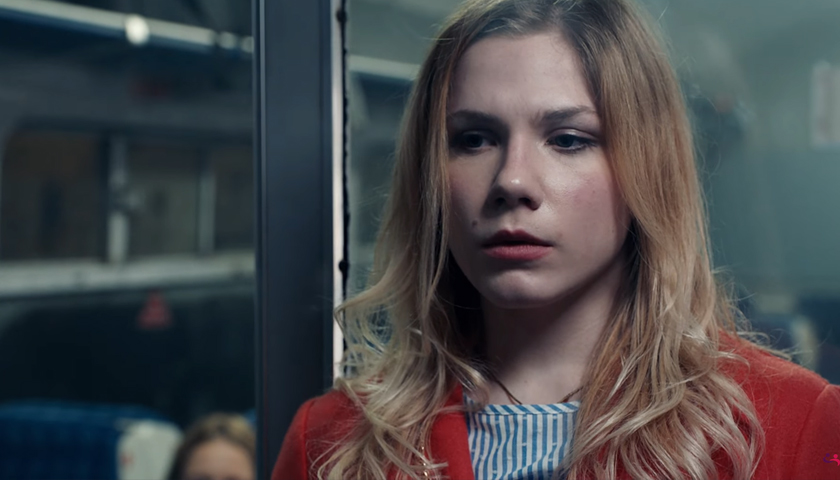On the first day of World Autism Awareness Week, the National Autistic Society has launched a powerful new film and shocking statistics as part of their public awareness campaign, Too Much Information, revealing the hidden isolation faced by many autistic people across the country.
The film follows an autistic woman who is so anxious about her train journey to work that she feels unable to leave the house at all. She becomes completely overwhelmed as she imagines all the things that could go wrong: delays, diversions and cancellations, loud crowds and the tuts and stares that come when her discomfort becomes visible.
Saskia Lupin, 21, is autistic and plays the lead role. This was a very personal project for her, as her own experiences reflects her character she is playing, so much so, that she felt very emotional when she first watched the film.
The National Autistic Society believes we can all make a difference by finding out more about what it can be like to be autistic and the small changes that can help make the world more autism friendly.
According to a 2018 National Autistic Society survey of over 2,000 autistic people or parents responding on their behalf:
- 75% of autistic people say that unexpected changes, like delays, diversions and cancellations, make them feel socially isolated.
- 67% of autistic people say that the public react negatively (stare, tut, make comments, roll their eyes) when they try to calm themselves down (flapping their hands or rocking back and forth) to unexpected changes
- 52% of autistic people said that a fear of experiencing unexpected changes has stopped them from going on a bus or train.
- 59% of autistic people say that the impact of an unexpected change is that it ruins their entire day.
- 36% of autistic people said that unexpected changes are the worst things about public transport.
- 96% of autistic people say they experience anxiety as a result of unexpected changes.
More than 1 in 100 people are on the autism spectrum, that’s around 700,000 people in the UK. Being autistic means seeing, hearing and feeling the world in a different, often more intense way to other people. Autistic people often find social situations difficult and may struggle to filter out the sounds, smells, sights and information they experience, which can leave them feeling overwhelmed, particularly in busy public places.
Saskia Lupin said: “Unexpected changes make me feel anxious, they make me panic, they make me angry but overall I feel confused, like I can’t do anything and all sense of rationality is lost.
“I am autistic and an aspiring actor so I felt really passionately about starring in this film to help improve understanding of autism. When I watched the film, I got really emotional as for the first time, I felt like people would understand what it feels like to be autistic and experience unexpected changes.
“Being autistic can feel very lonely and isolating. Even if you are surrounded by a group of people, you feel alone because you feel different and it takes up a lot of energy trying to keep up with social cues. I hope this video will help encourage the public to learn more about autism.
“It can be something as simple as not staring, or giving me some space that can make life so much easier. I have recently been served in the ticket office at my local station by a really kind man, When he saw how anxious I was about my upcoming journey, he took the time to write out a detailed plan of my route and run me through what I would need to do when I changed trains and alternative routes if something went wrong. I can’t explain how much that meant to me.”
Mark Lever, Chief Executive of the National Autistic Society, said: “At the National Autistic Society, we won’t accept a world where autistic people are shut away. We know that people don’t set out to be judgmental towards autistic people. The problem is that they often don’t see the autism, they just see somebody acting in a way that isn’t familiar to them.
“We can’t make the trains run on time. But we can all make a big difference this World Autism Awareness Week, by finding out more about autism and the small things we can do to make the world more autism friendly. For instance, if you see someone having a hard time, just like the character in our film, you can help by understanding that the person could be autistic and not staring or giving them a bit of space.
“We’ve got lots of ideas on our website autism.org.uk and would encourage everyone to take a look.”
The National Autistic Society is also calling on transport organisations to do their bit too, by finding out about the needs of autistic passengers or following in the footsteps of Gatwick Airport by achieving an Autism Friendly Award. The charity has also fed into the Department for Transport (DFT)’s Accessibility Action Plan consultation and is collecting the experiences of autistic people, families and friends, to demonstrate why this work is so important and the kind of changes that would make a difference.

